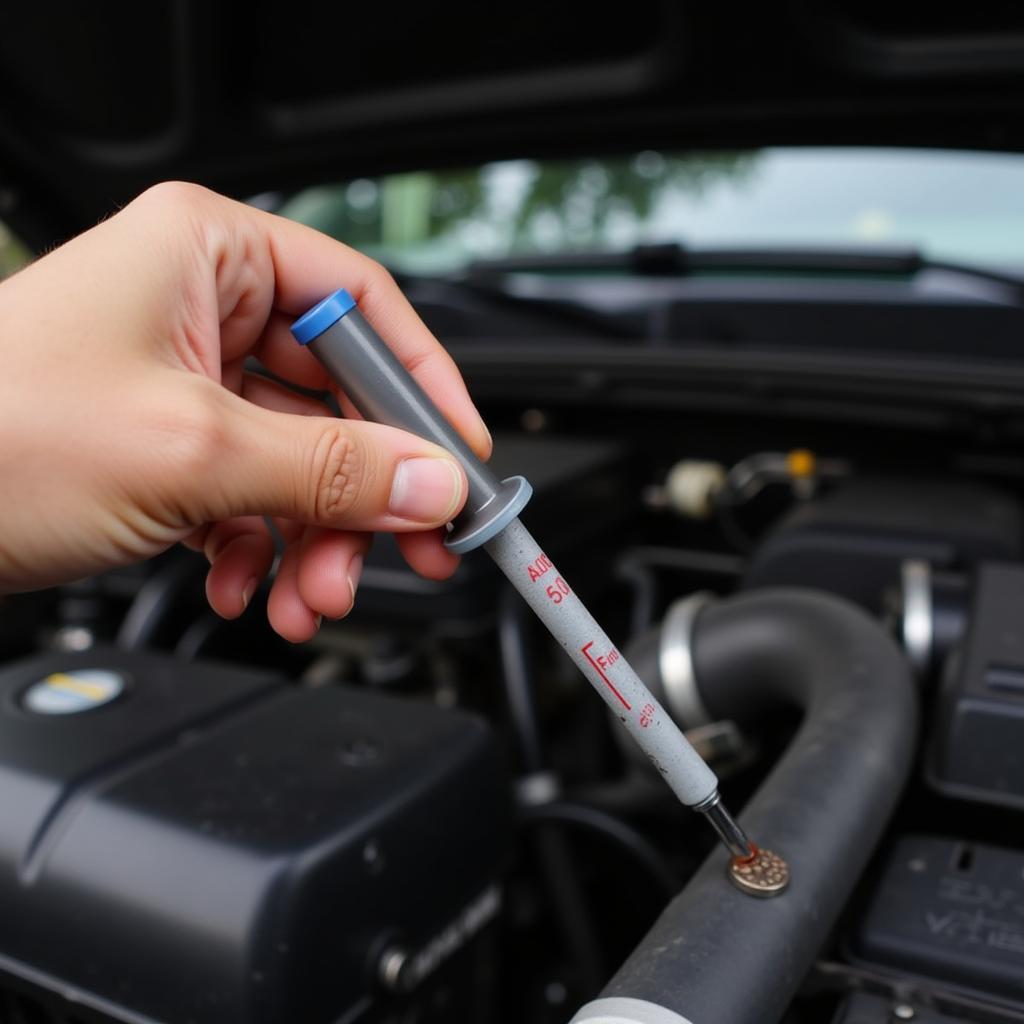That annoying sloshing sound in your car? It’s more than just irritating; it could indicate a potential problem. This article explores the common causes of that liquid sloshing sound and provides practical solutions to help you fix it yourself or know what to discuss with your mechanic.
Common Causes of Sloshing Sounds in Cars
Several issues can lead to a sloshing sound, ranging from simple fixes to more complex problems. Let’s break them down:
Fuel Tank Issues
A partially filled fuel tank is the most common culprit. As the fuel sloshes around, especially when cornering or braking, it creates that distinctive sound. This is perfectly normal. However, if the sound is excessively loud or accompanied by a fuel smell, it could indicate a leak or a problem with the fuel tank baffling system.
Coolant System Problems
A sloshing sound, particularly when the engine is running or shortly after turning it off, might signal a problem with the coolant system. This could be due to a low coolant level, air trapped in the system, or a failing water pump.
Washer Fluid Reservoir
A full washer fluid reservoir can also produce a sloshing sound, especially when driving over bumps or uneven surfaces. While usually harmless, check for leaks if the sound persists despite topping off the fluid.
Hidden Water Leaks
Water can accumulate in various areas within a car, such as the doors, floorboards, or trunk, often due to clogged drain holes. This trapped water can create a sloshing sound as the car moves.
Other Less Common Causes
While less frequent, a sloshing sound could also originate from a problem with the power steering fluid reservoir, a leaking shock absorber, or even something as simple as a loose object rolling around in the trunk or glove compartment.
How Do I Fix the Sloshing Sound? (Troubleshooting Guide)
Identifying the source is the first step towards fixing the sloshing sound. Here’s a step-by-step guide:
-
Determine the location: Try to pinpoint where the sound is coming from (front, back, left, right). Does it happen when turning, braking, or going over bumps?
-
Check fluid levels: Inspect your fuel, coolant, and washer fluid levels. Top them off if necessary and observe if the sound disappears.
-
Inspect for leaks: Look for any signs of leaks under the car, in the engine bay, or inside the cabin.
-
Check for trapped water: Open the doors and trunk and feel for dampness or standing water. Look for clogged drain holes.
-
Listen carefully: Pay close attention to the sound’s characteristics. Is it a gurgle, a splash, or a swish? This can help narrow down the possible causes.
When to Seek Professional Help
If you’ve tried the troubleshooting steps and the sloshing sound persists, or if you notice any leaks or other concerning symptoms, it’s best to consult a qualified mechanic.
“Ignoring a persistent sloshing sound can lead to more significant problems down the road,” says automotive expert, Robert Johnson, ASE Certified Master Technician. “A simple check-up can prevent costly repairs in the future.”
Conclusion: Addressing That Annoying Sloshing Sound
Addressing the sloshing sound in your car can range from a simple fluid top-up to a more involved repair. By understanding the potential causes and following the troubleshooting steps, you can often identify and fix the problem yourself. However, don’t hesitate to reach out to a professional if you need assistance. Contact Autotippro at +1 (641) 206-8880 or visit our office at 500 N St Mary’s St, San Antonio, TX 78205, United States, for expert advice and assistance. We’re here to help you keep your car running smoothly and quietly.
“Regular maintenance and prompt attention to unusual sounds can significantly extend the life of your vehicle,” adds Sarah Miller, Lead Mechanic at AutoTipPro. “Don’t let a small issue become a major headache.”
FAQ
-
Is a sloshing sound in my car always a problem? Not necessarily. A small amount of sloshing from the fuel tank is normal.
-
What if I smell fuel along with the sloshing sound? This could indicate a fuel leak, which requires immediate attention.
-
Can a low coolant level cause a sloshing sound? Yes, a low coolant level can introduce air into the system, leading to a gurgling or sloshing sound.
-
How can I prevent water from accumulating in my car doors? Ensure the door drain holes are clear and free of debris.
-
What should I do if I find a leak under my car? Try to identify the fluid and consult a mechanic as soon as possible.
-
Can I drive my car with a sloshing sound? It depends on the cause. If it’s a minor issue like a low washer fluid level, you can likely drive safely. However, if you suspect a more serious problem, it’s best to avoid driving and seek professional help.
-
How much does it typically cost to fix a sloshing sound issue? The cost varies depending on the cause. A simple fluid top-up is inexpensive, while a more complex repair like a fuel tank replacement can be more costly.






Leave a Reply